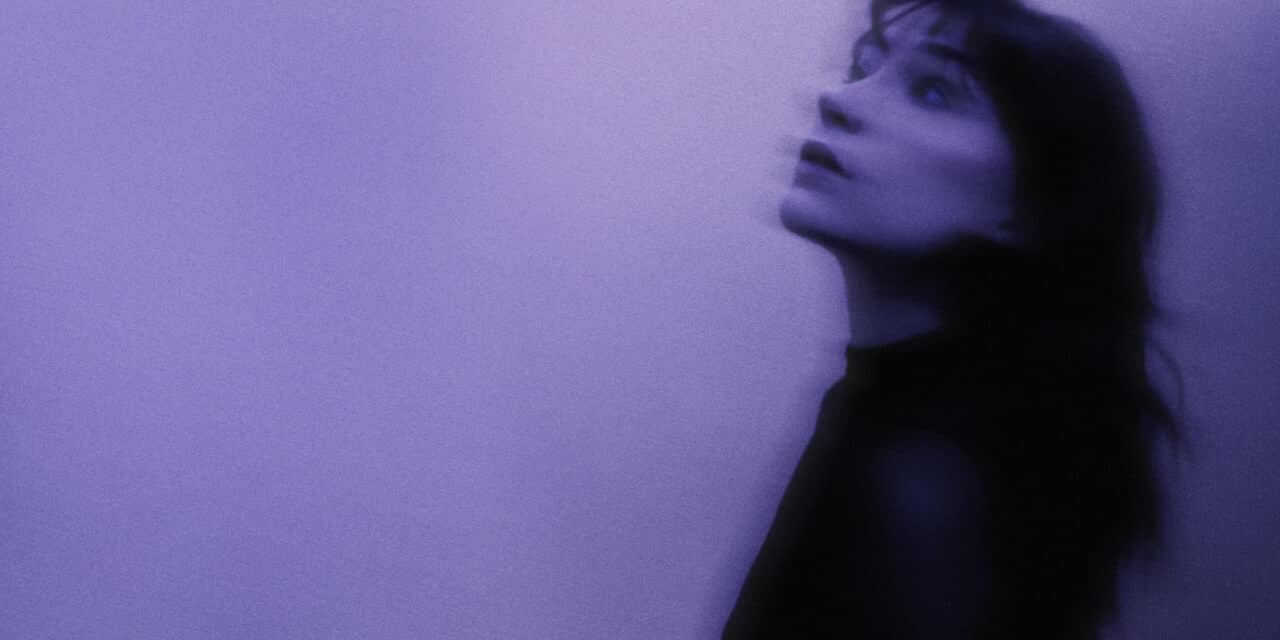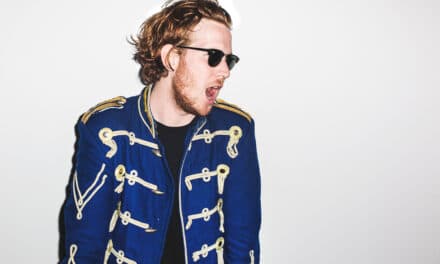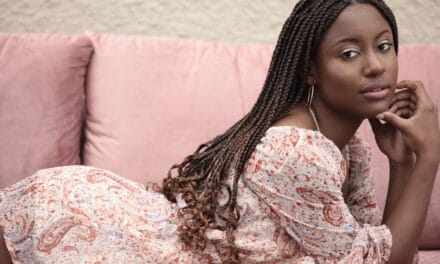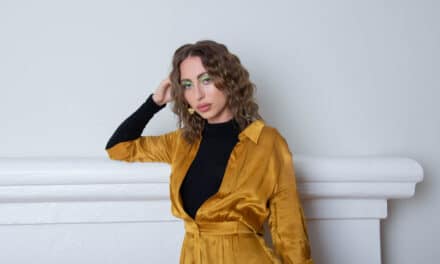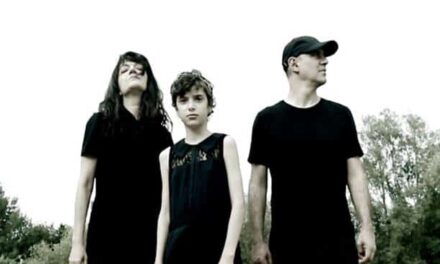A multi hyphenated artist, Ruby McKinnon creates melancholic folk music with a bedroom pop heart under the moniker Flower Face. Taking inspiration from her own vertiginous life experiences, alongside such
varied sources as Lemony Snicket’s Series of Unfortunate Events, Jesus Christ Superstar, the oeuvre of Mads Mikkelsen and her dog Ziggy, Flower Face’s musical testimonials recall the jagged emotion of Bright Eyes while conjuring the ethereal ecstasy of a fresh wound.
Classically trained in piano since the age of 5, McKinnon began writing her own music at 14. Encouraged by her music-obsessed parents, she formed Flower Face in true D.I.Y. style: recording her independent
Debut, Fever Dreams, almost exclusively on her dad’s GarageBand app. Teeming with acoustic heartbreak hymns, it didn’t take long for the album to find space on bedroom playlists alongside The National, Daughter, Big Thief, and Mazzy Star.
In 2018, McKinnon expanded her sound, hooking up with producer and long-time family friend Joshua Kaiser for her breakthrough sophomore release, Baby Teeth. Featuring an increasingly evocative sonic palette and deeper thematic constructs, the album dealt with, among other things, McKinnon’s own battle with stage three ovarian cancer at the age of 17.
Thinking back on her diagnosis, McKinnon says it was her “close brush with the grim reaper” that ultimately made her realize she needed to pursue a career in music.
What’s your story as an artist?
I’ve been an artist since I was a little kid. I grew up drawing and playing piano. I started writing songs at 14, and releasing them on Bandcamp. It was always just something I did for fun, until a few years ago, when I realized it was stupid not to seriously pursue what I love. As soon as I decided it was my path, things started to fall into place.
What inspired the last release “Cornflower Blue”?
This was the first song that I wrote after a very long period of writer’s block. I had the one line – you love me til you wear me out, then you love me more – floating around in my head, and the rest of the song grew from that very quickly. It’s about being exhausted by the complexities and pressures of a relationship. You can’t access the pure feelings or enjoyment because there are so many layers obscuring that. You’ve hurt each other in so many ways and you’re both carrying all this resentment and distrust and so you can’t get through to them. You’re looking at each other and speaking to each other but you aren’t really seeing or hearing each other. It’s frustrating and it makes you feel weak and hopeless. This song is about the point of no return, where the truth comes to the surface, and you can no longer pretend things are okay. It’s not that there’s a lack of love — there is so much love. It’s just become so warped and corrupted that it doesn’t even resemble the love you used to know.
What are some sources of inspiration for your storytelling?
A lot of it is just a collage of feelings and experiences I’ve lived through. You start with a feeling and it develops into a story, or a song, and it doesn’t always stay true to reality, but the core of my work is always honest. My writing is very diary-entry confessional, but even so I always stray from the autobiographical bounds. It’s more interesting that way. It’s an artistic privilege to rewrite your own history into something more beautiful or meaningful or poetic.
Any funny anecdotes from the time you were recording or writing this?
So we actually recorded this song before the rest of the record – almost like a test run. I had made a demo with Josh Kaiser (my guitarist, co-producer and main musical collaborator of the past five years) and then we were connected through my manager to Dream House Studios in Toronto. We drove up for three days in December of 2019 to record Cornflower Blue. It was all very new to us – we made my last record in Josh’s home studio, just the two of us. Now we were in a big studio with a whole team of people that we were meeting for the first time: Calvin Hartwick, the engineer, Alex Bonenfant, producer and owner of the studio, and Jay Merrow, another producer and arranger. They were all really nice and enthusiastic, but I was so nervous. I’m used to Josh hearing all my terrible vocal takes, but now I was in a live room singing this very emotional song with four guys on the other side of the glass listening, three of whom I’d just met that morning. So I kinda froze up and was not doing very well. Finally I admitted that I was nervous. Next thing I knew, Alex came into the live room and sat down on the floor and said “I’m just going to listen”. I was like, okay, this is a million times worse, I don’t think I can even attempt to sing like this. But I did. And between each take, he was asking me questions, about the meaning of the song, the story, the raw feeling behind it, and by the time we got to the last line, I had tears down my cheeks and felt like I’d been ripped open. It was pretty amazing. I’m so grateful for that day, because it changed the way I recorded the rest of the songs, too.
Tell us about the music video and the idea behind it?
The visuals were such a driving force in the creation of this song, I think I was conceptualizing the video pretty much the moment I wrote it. The idea developed and transformed over time, of course, but the core concept was always the same. I wanted the shots of me to convey this frustration and desperation and inability to connect, to reach the person that you love. You can see them and speak to them but nothing gets through in either direction. And then the two dancers are this perfect ideal, this fantasy of real love — until the second half, where it all goes dark. Dream to nightmare. Once you see the underlying corruption in the relationship, there’s no going back. I connected online with the director, Mathew Pimental, at the beginning of 2020. His style was so perfectly aligned with what I was imagining. Together we enriched the base ideas that I had, and after literally a year and a half of planning, we finally shot the video in July of 2021.
What’s a record that shaped your creativity?
This is a hard one, because there are so many! Fevers and Mirrors by Bright Eyes was hugely transformative to me as a young person. I started writing songs shortly after discovering their music, and that record really made me believe in the genre of intensely confessional, raw songwriting. I’ve always been a lyric person, and Conor Oberst was one of the first songwriters I fell in love with. I would literally read and study his lyrics. I think my core writing style comes from his work as well – choruses with different lyrics, no bridges, a million words in every song. I still revert to that whenever I write now.
Who is an artist or band you look up to today?
At this point in my life, I’d say The National have been the most influential. Where Bright Eyes helped me dig deep into the dark and put it all out there in my early songs, The National helped me put it into different words. If that makes sense.
Any future projects?
Yes! The moment I finished recording my new record, I started writing the next.
What is your view on genres and music styles since you mix a lot of them in your music?
I don’t think I could ever stick with one sound, because I listen to so many different sounds. When I’m writing, I try not to listen to anything that is remotely similar to my music, because then I’ll just start trying to replicate it, or I’ll compare myself and end up not writing at all cause I get discouraged. My favourite music is the kind where you can’t pin it to one genre, it’s bringing in little bits and pieces of everything. Because that’s art, right? Bits and pieces of everything that’s ever inspired you or made you feel something.
What does music and art mean to you?
I can’t imagine a life without music and art, because those things are literally all I do. When I’m not writing music, I’m drawing or designing cover art or editing videos. Work-life balance doesn’t really exist when you do art full time… I’m very lucky, but at the same time, it is my entire world. So I hope I can keep doing it forever.
How would you describe your act in one word?
Haunted.

